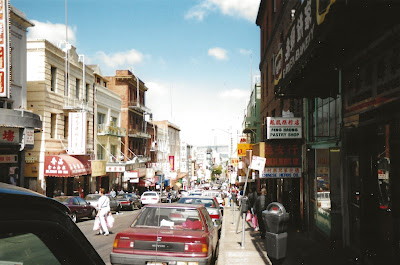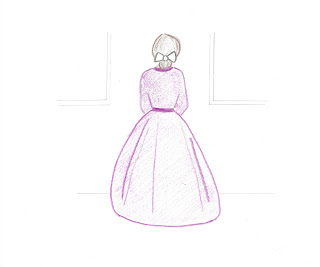Travel Flashback: A Bargain in Chinatown, 1998
Chinatown in San Francisco in 1998
I visited Chinatown in San Francisco in the summer of
1998. I met an artist and translator who
sold me a calligraphy painting. I wonder
how the Chinese artist who painted for me is doing. I have a greater
appreciation for the hard work of artists and translators. I should have paid
the extra dollar for my painting. It was well worth more. Please read on, and I
hope you see what I mean.
The Bargain
By Anna Krejci
The sights of Chinatown evoked my curiosity and
fascination with the blending of Chinese culture in America. As far as the eye
could see, the streets featured storefronts, each with Chinese characters
written on bright, colorful cloth awnings, or on vertical signs that protruded
from the angular forms of the buildings, resembling a collage of rectangles.
I meandered through a supermarket of Chinese culture. Nearly
every store utilized the sidewalk as a display that lured tourists to look.
Racks displayed postcards of San Francisco. One sign read, “Postcards 10 cents
ea.” Another store would sell them for a lower price. “5 for 10 cents,” read a
second sign. Impressed with myself that I discovered a better deal, I bought a
few more cards, only to encounter a third deal more attractive than the previous
two.
I passed rows of large, white tubs containing hundreds of identical
plastic spinning tops, tiny, beaded coin purses and handheld fans that folded
into black, metal handles.
Paintings of English names written in Chinese captured my
interest. I flipped through the pictures, looking for the drawing of a friend’s
name. After finding the correct name, I noticed the English translation in the
corner offered two different spellings. Thinking the picture would look
impersonal with two versions of my friend’s name, I proceeded to return the
picture to the rack when I saw a cardboard sign that read, “If you don’t find
one you want, I paint for you.”
I hesitated at reading the sign. I knew my friend would like
this picture immensely. I stared at it, admiring the written form of the
Chinese language.
I sensed someone approaching me. A middle-aged Chinese man
said, “You like this? I paint for you.”
“Will it cost extra?” I asked.
“A dollar,” he replied.
I looked hard at the picture.
The Chinese man must have read my face. Seeing that I
wavered on the brink of my decision, he suddenly muttered a string of
incomprehensible words and waved his hands as he walked toward the store’s
entrance.
I stood motionless, following him with my eyes.
“Okay, same price,” he said, with a hint of frustration in
his voice. I remained still, not fully realizing that I had bargained with this
man. Once more he beckoned assertively to me. I sprang forward and followed him
to his worktable.
I silently observed his motions. He dipped a paintbrush into
a bottle of black ink. With slow, confident strokes, the man guided the brush
over the paper. By pressing harder on the brush, the width of the dash widened,
and then narrowed as he relieved the pressure. I could not distinguish between
the brush and the paper’s surface. It seemed like the shiny, black ink welded
paper and brush.
For the finishing touch he wrote, “Picture in San Francisco”
and his initials along the right-hand edge of the paper.
In this vivid and real encounter with this man – shared by
the exchange of a few words and gestures – I had greater introduction to a
culture that could not be grasped by the purchase of fans or tiny, beaded coin
purses.


